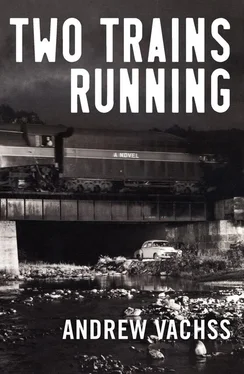As he leaned in, Tussy kissed him on the cheek, so butterfly-soft that he couldn’t be sure if it had actually landed.
“You want to know all about me, don’t you?” she said.
“Yes.”
“That’s so strange.”
“What is?”
“Just that you’d want to know, for real. When people ask, they really don’t, mostly. They’re just being polite. But what’s so… strange is that I know it myself, somehow. That you truly want to, I mean.”
“You don’t have to tell me anything you don’t-”
Tussy blew a jet of cigarette smoke to stop Dett from talking. “After my mother had me, she couldn’t have any more children, the doctor said. She used to tell people that was fine with her, because I was more than enough for anyone to handle.
“I had such a lovely life. I never knew how lovely it was until it happened. When I was fifteen.”
Dett watched Tussy’s face intently, silently willing her to go on.
“My parents were killed,” she said, quietly. “People said it was an accident, and I guess it was. But I say ‘killed,’ because that’s what happened to them. They were coming home from the movies. It was pretty late, but I was up, because I was waiting for people to come home from the movies, too. I was babysitting, for the Taylor kids. I was a great babysitter. Everybody wanted me, because I was so reliable. I’d been doing it since I was eleven. I bought all my own clothes for school with the money I made, and I even had extra left. I was so proud of that.”
“Drunk driver?” Dett said.
“They were all drunk,” Tussy said, pain and sorrow twisted in her voice, “every single one of them in that car. It was just before Pearl Harbor. Everyone knew we were going to war, sooner or later. My dad had been in World War I. He always said that was supposed to be the last one, but there would never really be a last one, not with the way people are…”
Tussy’s voice trailed off. Dett descended into the silence with her; he stood immobile, as if any movement would frighten her away.
Tussy took a deep drag of her cigarette, blew the smoke out in a vicious jet of anger. “They were all college boys,” she said. “Seven of them, in one car. They were going like maniacs. My folks were stopped at a light. They came right through the red and just… smashed them to pieces.”
“What happened to them?”
“I told you,” she said, sharply. “They were kil- Oh, you mean, what happened to the college boys? Nothing. They didn’t even get hurt. The driver walked away. I mean, he walked right out of his car. His big, huge new car. It crushed my dad’s little Ford like it was made of paper.”
“Did he go to jail? The driver, I mean.”
“Jail?” she said, bitterly. “I told you, they were rich boys. Maybe they got a ticket or something, I never knew. When the Taylors got home, we waited for my folks to come by and pick me up. But they never came. It got real late. There was a knock on the door, finally. It was the police.”
“Christ.”
“You know what? I didn’t believe them. No matter how many times they said it, I wouldn’t listen. They took me to the hospital. They had my… they had my mom and my dad there. When I saw them, all… I don’t remember what happened after that.”
“Did people take you in?”
“Nobody took me in,” Tussy said, fiercely. “I quit school. I got a job. The same job I have right now today. And I never missed one single payment on our house.”
“Didn’t anyone… make trouble or anything, you being all by yourself?”
“Well, they sure tried,” Tussy said, leaning back and supporting herself with one palm against the hood. “The Welfare people said I had to go to a foster home. Even the school, they said I was too young to drop out. I could get working papers, for part-time, but I couldn’t leave school entirely, is what they said. And the bank said I couldn’t take over the mortgage, because I wasn’t of age.”
“But…?”
“But Mr. Beaumont-he’s the biggest man in Locke City-he saved me. With everybody acting like I was a baby, I was so scared. I thought I would lose… every last trace of my mom and dad. But this one policeman, he told me, ‘Miss, you go and see Mr. Beaumont. He can fix things.’ And that’s just what I did,” she said, reflectively. “I knew the proper thing would be to write him a letter, but I couldn’t wait. I was too terrified. I couldn’t just sit in my house and have them come for me. So I started walking.”
“You walked to-? I mean, was it far?” Dett hurriedly amended.
“It was real far. The policeman, the nice one, he told me where it was, but I had never been way out in the country. I mean, we went out there, for picnics and stuff, but not to where Mr. Beaumont lives. That’s a different kind of country, you know?”
“Sure. Rich country.”
“Yes! First, I hitched. I knew that was stupid. If my dad had ever caught me pulling a stunt like that, he would have…”
Tussy tossed away her cigarette, put her face in her hands, and started to sob. Dett held her against him, protectively, not moving his hands, his face as flat and blank as a slab of stone. He felt his own heart-a fist-tight knot in his chest, pulsing hate.
1959 October 05 Monday 23:01
“What do you make of it, Sally?”
“It’s a list of some kind, G. Maybe the letters are the jobs he’s been hired to do, and the numbers are the payoff?”
“Could be, I guess. But what’s with the buildings? I mean, banks, I could see. Even the post office, there’s money there, if you know where to look. But the police station? That don’t make any sense.”
“I know. But let’s say those letters, they stand for people, okay?”
“Okay,” the scar-faced man said, noncommittal.
“One of them, the letter is ‘D.’ What’s that tell you?”
“The truth, Sal? Nothing. Not a damn thing. Those numbers, they’re not right. See where the ‘D’ is on the list? Second, not the top. And the number next to it, that’s half of the number across from the ‘X.’ Even if it was a hit list, nobody gets fifty grand. Nobody. Even the guys who did the job on Albert, they got ten apiece. And those guys, they were famiglia, not some outside contract men. If you’re the ‘D’ on that list for twenty-five K, then who’s ‘X,’ for fifty?”
“I’m not saying that’s what it is, G. But I know this: it means something. This guy, Dett, it’s more like he’s a fucking Russian spy than a hit man.”
“In Locke City?”
“You making a joke, G.?”
“No, Sal.”
“No? Good. Because I got news for Mr. Walker Dett. Sal Dioguardi’s not some fucking cafone; he’s a man with a mind. See this number, here?”
“Yeah.”
“Mean anything to you?”
“Not to me.”
“It’s a phone number, G. You know how I know?”
“How?”
“The last three numbers, that was the tip-off.”
“Two-one-three?”
“Yeah. Look, I cover those numbers with my finger-see?-what do you have left?”
“Sally, I swear I’m not-?”
“You got seven numbers,” Dioguardi said, excitedly. “That’s a telephone number, G. Now, if you want to call long distance, you need an area code, right?”
“Right.”
“Which is how many numbers?”
“Three. Huh! So you think the whole thing, it’s a phone number?”
“Those last three numbers? Two-one-three? That’s the area code for L.A., Gino.”
“And this guy, we know he didn’t have a car when he came in; he had to rent one here,” the scar-faced man said. “It all adds up, Sal.”
“Yeah,” said Dioguardi, thoughtfully. “We talked about you going out to L.A. anyway. For that other business. Okay, this moves things up a bit: I want you on the next plane out, G. Tomorrow, okay?”
Читать дальше












